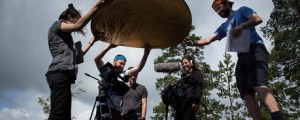An Introduction to our Filmmaking Masters.
An intensive two-year course in the heart of London, the MA Filmmaking trains to a professional level in a full range of filmmaking skills. Students leave with a portfolio of directing, cinematography, editing, producing and sound credits on at least 10 films – usually many more. The school produces around 180 films each year on this particular programme and last year these screened at over 180 festivals, winning many prizes, including the Cannes Palme d’Or for Best Short Film, the most prestigious festival accolade.
Learning is based around short film production. Each term these film exercises become more technically sophisticated, more considered and more complex in their ambitions. The school specifies the skill base for each exercise, providing the equipment and training students to new levels in each of the various craft skills. Students make all aesthetic decisions, while solving problems similar to those faced by professional units, on a steeply increasing slope of difficulty. The work is constantly assessed and critiqued.
This is the core of The London Film School method. Students learn by applying themselves to aesthetic and practical problems generated by the actual process of filmmaking. This is why the school pushes through so many productions, and why students have more opportunities to work on films than they can realistically take up.
A Competitive Edge
All LFS students learn important filmmaking skills, and practise them in a working unit. There is no film career which is not greatly enriched by an active practical knowledge of the other specialisations. This makes an LFS graduate stand out from future professional colleagues with a single specialisation, at any level.
Our teaching method
Students’ creative abilities are mobilised and developed by multiple approaches:
![]() |
They are taught to look at film history, and a great range of contemporary and classic work, in varying critical contexts, but most importantly as the outcome of practical strategies that they can use for framing, criticising and developing their own take on screen storytelling. |
![]() |
They develop their own work, and then get the opportunity to test it out freely with colleagues, teachers and professional practitioners in workshops designed to connect ideas and outcomes and in which their work is criticised without applying any further restriction than their own growing judgement and consciousness of effect and context. |
![]() |
In the film exercises students shoot their own scripts, directed in their own way. The content of all films is fully discussed and criticised, but ultimately the students have complete freedom of expression. This is an opportunity to exercise their creative abilities, for them to see their ideas brought to life, with professional actors, on film, and under production conditions appropriate to the developing skills of the crew, culminating in the Alexa studio film of the standard industry production. |
![]() |
The film exercises are programmed by the School, and are tightly scheduled, requiring the students to learn to work under time discipline. Crews are compact, and consequently there is always need for assistants from the lower terms. Up to sixty films are made each term, which means that whenever students are not busy with their own projects, their services are in demand on many others. This creates a constant sense of excitement, a constant presence of film-making, which becomes the atmosphere and life of the School, a tremendous motivating force. |
|
Students are continually learning from each other and from the immense range of practical and aesthetic problems the different films offer. This process continues all day, often through the evening, and flows between the sets and locations, the viewing theatres, editing suites, the coffee bar and back again, all term. |
